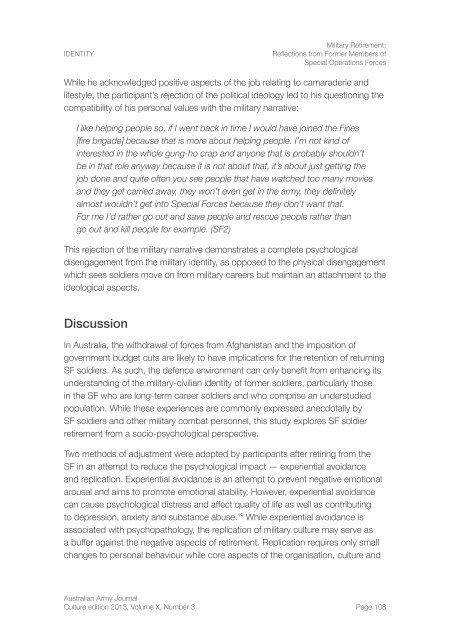Australian Army Journal
Australian Army Journal
Australian Army Journal
Create successful ePaper yourself
Turn your PDF publications into a flip-book with our unique Google optimized e-Paper software.
IDENTITY<br />
Military Retirement:<br />
Reflections from Former Members of<br />
Special Operations Forces<br />
While he acknowledged positive aspects of the job relating to camaraderie and<br />
lifestyle, the participant’s rejection of the political ideology led to his questioning the<br />
compatibility of his personal values with the military narrative:<br />
I like helping people so, if I went back in time I would have joined the Firies<br />
[fire brigade] because that is more about helping people. I’m not kind of<br />
interested in the whole gung-ho crap and anyone that is probably shouldn’t<br />
be in that role anyway because it is not about that, it’s about just getting the<br />
job done and quite often you see people that have watched too many movies<br />
and they get carried away, they won’t even get in the army, they definitely<br />
almost wouldn’t get into Special Forces because they don’t want that.<br />
For me I’d rather go out and save people and rescue people rather than<br />
go out and kill people for example. (SF2)<br />
This rejection of the military narrative demonstrates a complete psychological<br />
disengagement from the military identity, as opposed to the physical disengagement<br />
which sees soldiers move on from military careers but maintain an attachment to the<br />
ideological aspects.<br />
Discussion<br />
In Australia, the withdrawal of forces from Afghanistan and the imposition of<br />
government budget cuts are likely to have implications for the retention of returning<br />
SF soldiers. As such, the defence environment can only benefit from enhancing its<br />
understanding of the military-civilian identity of former soldiers, particularly those<br />
in the SF who are long-term career soldiers and who comprise an understudied<br />
population. While these experiences are commonly expressed anecdotally by<br />
SF soldiers and other military combat personnel, this study explores SF soldier<br />
retirement from a socio-psychological perspective.<br />
Two methods of adjustment were adopted by participants after retiring from the<br />
SF in an attempt to reduce the psychological impact — experiential avoidance<br />
and replication. Experiential avoidance is an attempt to prevent negative emotional<br />
arousal and aims to promote emotional stability. However, experiential avoidance<br />
can cause psychological distress and affect quality of life as well as contributing<br />
to depression, anxiety and substance abuse. 19 While experiential avoidance is<br />
associated with psychopathology, the replication of military culture may serve as<br />
a buffer against the negative aspects of retirement. Replication requires only small<br />
changes to personal behaviour while core aspects of the organisation, culture and<br />
<strong>Australian</strong> <strong>Army</strong> <strong>Journal</strong><br />
Culture edition 2013, Volume X, Number 3 Page 108

















